Bali’s hidden places are easy to miss if you only follow the main roads. These are the parts of the island where little has changed. A stone path might lead to a forest shrine or a bend in the trail might open up to a quiet stream. You may hear the sounds of birds and rushing water instead of traffic. Villagers go about their day without a hint of rush. Here, everything moves slower. These places do not try to impress, they simply exist as they have for years.
10 Hidden Places In Bali Worth Visiting
These Bali hidden places carry their charm through silence, simplicity, and the absence of crowds.
1. Tukad Cepung Waterfall
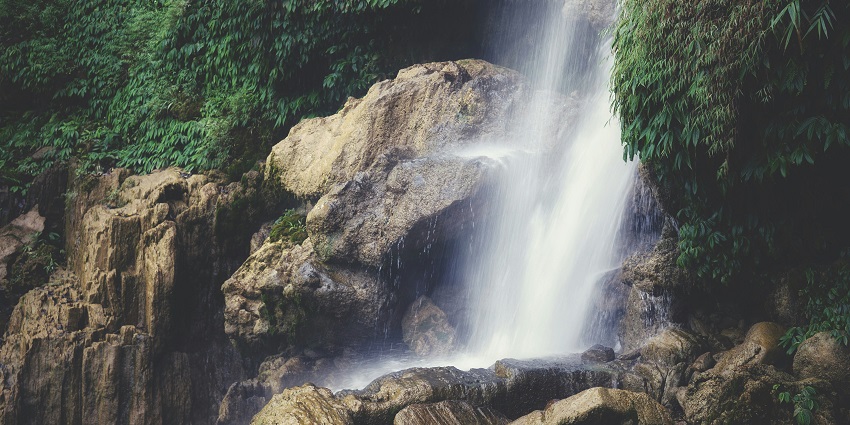
Photo: Conikal / Unsplash / Image For Representation Only
Tukad Cepung is one of the few Bali’s hidden places that still feels untouched. The walk begins with a series of uneven stone steps leading through the quiet forest. There are no signs or distractions, just the sound of insects and the occasional breeze. At the bottom, the space narrows into a canyon. The walls rise high and damp, covered in moss, while a stream cuts through the rock. As you follow the path, light begins to filter down from the gap above. Then, the waterfall comes into view, flowing through a shaft of sunlight.
Cost: Rp 15,000 / ₹80
Timings: 6 AM – 5 PM
Nearby Attractions: Tibumana Waterfall, Goa Giri Campuhan, Pengibul Waterfall
2. Sidemen Valley
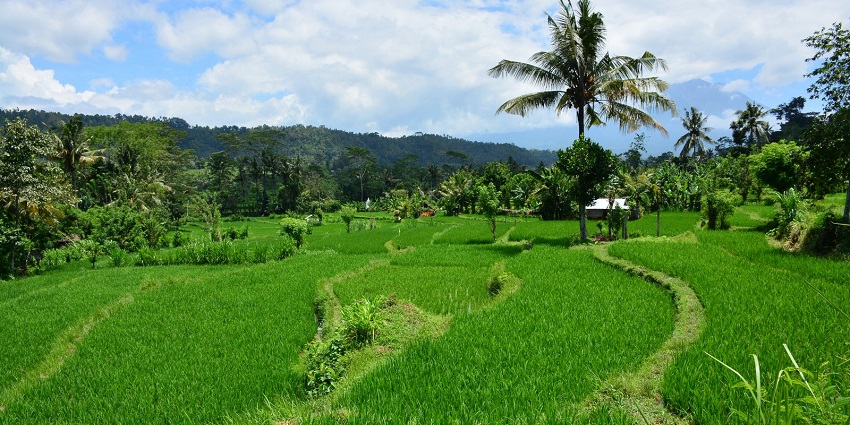
Photo: Paul Arps / Wikimedia Commons
Sidemen Valley lies east of Ubud, away from the noise, surrounded by terraced rice fields and thick forest. It is one of the few Bali’s hidden places where tradition continues quietly. Villagers farm the land by hand. Woven fabrics dry on bamboo fences. Small shrines sit beside narrow footpaths. The landscape opens slowly as you walk, with soft hills leading to views of Mount Agung in the distance. The air is cooler here, and you’ll often hear the sound of water trickling from the canals that feed the paddies.
Timings: 24*7
Nearby Attractions: Telaga Waja River, Besakih Temple, Tukad Yeh Unda
3. Sambangan Secret Garden
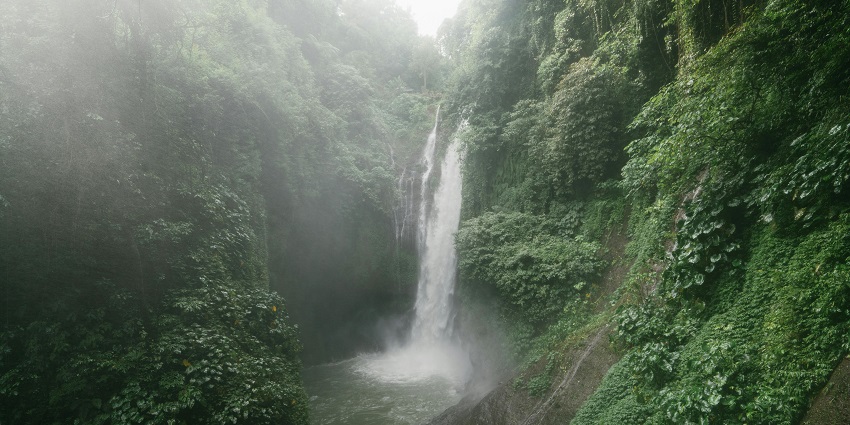
Photo: ArtHouse Studio / Pexels / Image For Representation Only
Deep in North Bali, Sambangan is one of those places that feels like it was never meant to be found by accident. The village itself is quiet, with narrow roads and homes set among fruit trees. To reach the garden, you follow a trail used mostly by locals, muddy in places but rich in sound. Birds call from the canopy, and the air smells like wet leaves and lime. The path leads to a series of waterfalls, each tucked between mossy rocks. The water is cold, and locals swim without hesitation. One spot has a natural slide, carved smooth over time.
Cost: Rp 50,000 / ₹265 for guided trekking
Timings: 7 AM – 4 PM
Nearby Attractions: Aling-Aling Waterfall, Gitgit Waterfall, Banyumala Twin Falls
4. Taman Beji Griya Waterfall
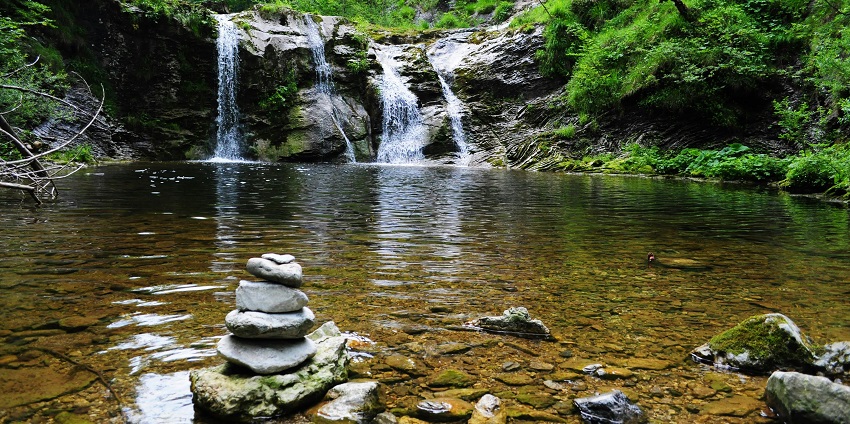
Photo: Manuela Adler / Pexels / Image For Representation Only
Taman Beji Griya is one of the more sacred Bali’s hidden places, where water and ritual come together. Located north of Canggu, it is part of a purification site tucked into the forest. To enter, visitors wear a sarong and are guided through a cleansing ceremony led by local priests. The path winds along a stream, past statues covered in moss and offerings made from flowers, rice, and incense. The waterfall is not large, but it flows through a narrow channel of stone, creating a natural curtain. Bathing here is not just allowed but it is encouraged.
Cost: Rp 30,000 / ₹160 including sarong rental
Timings: 7 AM – 6 PM
Nearby Attractions: Sangeh Monkey Forest, Taman Ayun Temple, Nungnung Waterfall
5. Bukit Cinta Viewpoint
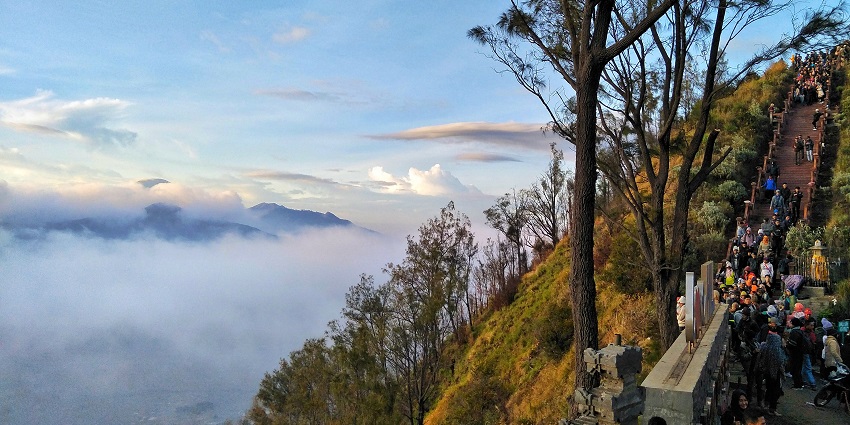
Photo: Deditriantoro / Wikimedia Commons
Bukit Cinta is one of Bali’s hidden places where silence carries weight. Sitting in Karangasem Regency, this hill offers a wide view of Mount Agung rising over rice fields. There are no signs pointing you there, and the road is quiet. Farmers pass by on scooters, sometimes carrying baskets filled with grass or chickens. The viewpoint is a narrow strip of land, not developed or managed. You stand among grass and wildflowers, with the mountain directly ahead and the morning fog still lifting from the fields. Locals sometimes stop here to rest before heading to their farms.
Timings: Best visited around sunrise
Nearby Attractions: Lempuyang Temple, Tirta Gangga, Taman Ujung Water Palace
6. Gunung Kawi Sebatu Temple
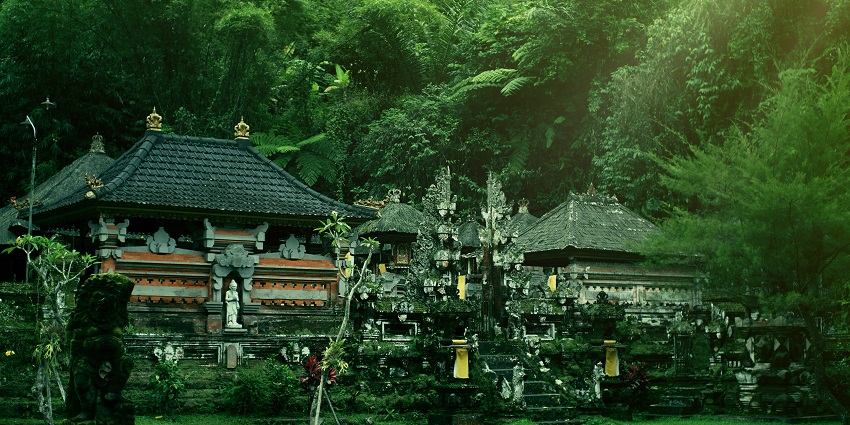
Photo: Anggabuana / Wikimedia Commons
Gunung Kawi Sebatu Temple stands quietly on a forested hillside near Tegallalang. Built in the 14th century, it is dedicated to Vishnu and surrounded by spring-fed pools that mirror the sky. Unlike its namesake in Tampaksiring, this temple is rarely crowded. The complex includes an outer courtyard with large koi ponds, an inner courtyard with carved shrines, and a series of fountains used for ritual bathing. Moss-covered statues, frangipani trees, and shrines wrapped in checked cloth give the temple its character.
Cost: Rp 20,000 / ₹105
Timings: 8 AM – 6 PM
Nearby Attractions: Tegallalang Rice Terraces, Tirta Empul Temple, Mount Kawi Temple
7. Banyumala Twin Waterfalls
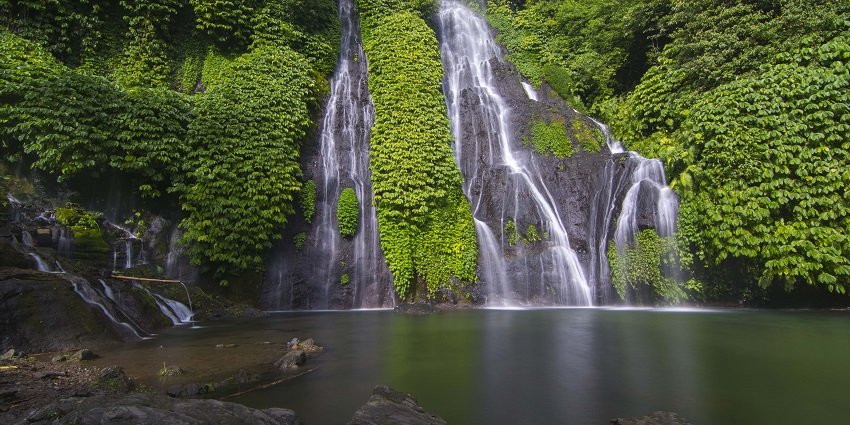
Photo: Made agus devayana / Wikimedia Commons
Banyumala Twin Waterfalls lie hidden in the hills of Munduk, and they remain one of Bali’s most secluded hidden places. The drive takes you through sharp bends and thick forest, ending at a rough trail that descends into a lush valley. The waterfalls appear side by side, pouring down a rock face draped in moss and vines. Beneath them lies a clear, wide pool where visitors can swim in cool, fresh water. The area is natural, with no concrete paths or commercial stalls, only a bamboo footbridge and steps cut into the earth.
Cost: Rp 20,000 / ₹105
Timings: 7 AM – 6 PM
Nearby Attractions: Lake Buyan, Lake Tamblingan, Wanagiri Hidden Hills
8. Jatiluwih Rice Terraces
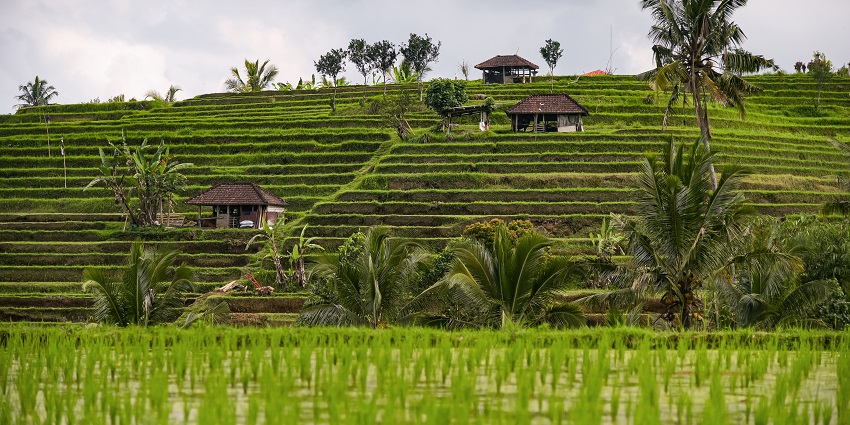
Photo: Jorge Franganillo / Wikimedia Commons
Jatiluwih is one of the most expansive places, stretching across the foothills of Mount Batukaru. These rice terraces follow the contours of the land, forming smooth green waves that seem to go on forever. Unlike the more photographed fields in Tegallalang, Jatiluwih is part of a centuries-old Subak system, a traditional method of cooperative irrigation recognised by UNESCO. Farmers still work here by hand, using wooden ploughs and guiding buffalo through the mud. Walking paths lead past shrines, bamboo huts, and water channels that flow gently between levels.
Cost: Rp 20,000 / ₹105
Timings: 8 AM – 6 PM
Nearby Attractions: Batukaru Temple, Angseri Hot Spring, Pura Luhur Besi Kalung
9. Tegal Wangi Beach Cave
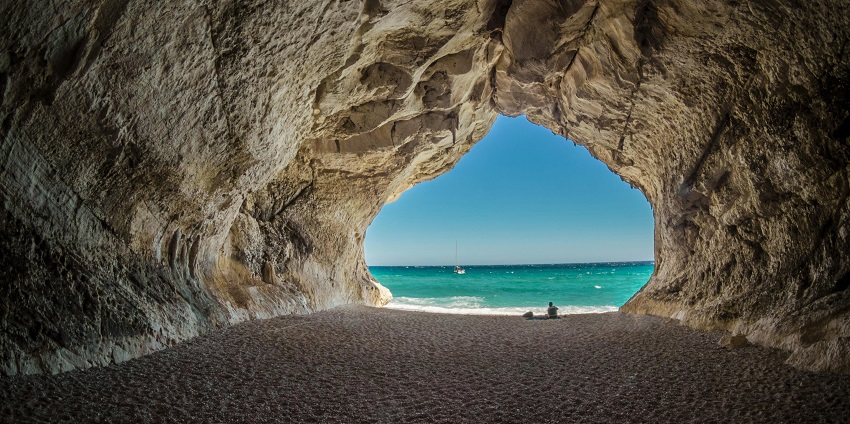
Photo: Pixabay / Pexels / Image For Representation Only
Tegal Wangi Beach Cave is one of Bali’s hidden places, known mostly through word of mouth. Found near Jimbaran, it doesn’t seem special at first. But if you walk along the jagged edge during low tide, a narrow opening in the cliff appears. The rock bends naturally inside, sheltering you from above while opening out to sea. Pools collect along the shore, shallow and warm, where people sit quietly and let the waves pass. The sand is coarse and light-coloured, and the cliffs surrounding the beach rise unevenly according to time and weather.
Timings: Best visited at low tide and sunset
Nearby Attractions: Jimbaran Bay, Rock Bar Bali, Garuda Wisnu Kencana Park
10. Penglipuran Bamboo Forest
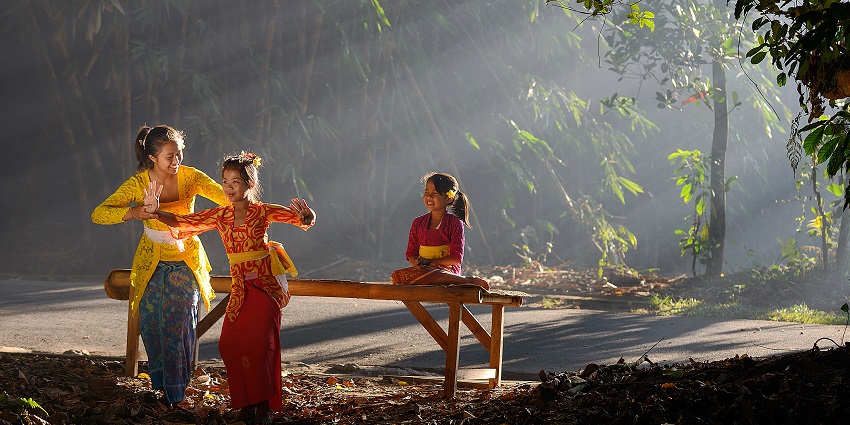
Photo: Hendri Suhandi / Wikimedia Commons
Penglipuran Bamboo Forest lies just beyond the village, forming a long shaded stretch of land that feels quiet from the start. Tall bamboo stalks grow close together on both sides of the path, leaning in to create a soft arch overhead. There are no fences or signs, only a narrow lane lined with scattered leaves. The sound of the forest is gentle with wood creaking, leaves shifting, and birds calling from time to time. Villagers maintain this forest as part of their home. Shrines sit at the base of some clusters, where small offerings are placed daily without ceremony.
Cost: Rp 15,000 / ₹80
Timings: 8 AM – 5 PM
Nearby Attractions: Kehen Temple, Tukad Cepung Waterfall, Kintamani Highlands
Bali’s hidden places are more than escapes, they are reminders of what the island was before it became a destination. Each of these spots holds something real, like silence, ritual, nature, or memory. If you’re planning a trip and want to step off the usual path, these places are worth the time. TripXL can help you reach them without missing what matters.
Cover Photo: Niklas Weiss / Unsplash


 WhatsApp
WhatsApp
 Twitter
Twitter









